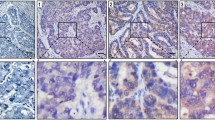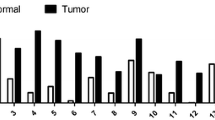Abstract
Previous reports had indicated that there was a possible correlation of dystroglycan (DG) with biological behavior of cancer cells and cancer patients’ survival. However, the role of DG expression in gastric cancer was rarely studied. In this study, α-DG and β-DG expression were determined by immunohistochemistry in specimens of primary cancer, metastatic lymph node, distal metastatic lesion, and their normal counterpart tissues in 20 gastric cancer patients. Correlations between α-DG and β-DG expression and prognosis were retrospectively analyzed. Our results found that positive expression of α-DG in normal mucosa, paired primary tumor, metastatic lymph node and distal metastatic site was detected in 95%, 70%, 25%, and 5% specimens, individually. Regarding β-DG,it was 70%, 55%, 10%, and 10%, individually. Patients who had lower α-DG expression in tumors than in normal counterparts showed poor survival (p = 0.002), whereas such a correlation was not found in the case of β-DG (p = 0.079). Difference of α-DG between primary tumor and its normal counterparts was an independent prognostic factor in gastric cancer with distal metastasis. This study showed DG expression was gradually reduced during tumor progression. Different expression of α-DG, but not β-DG, between primary tumor and normal specimen, correlated with patient survival, implicating a potential marker for gastric cancer prognosis.



Similar content being viewed by others
Abbreviations
- DG:
-
dystroglycan
- ECM:
-
extracellular matrix
- mLN:
-
metastatic lymph node
References
Jemal A, Siegel R, Xu J, Ward E (2010) Cancer statistics, 2010. CA Cancer J Clin 60:277–300
Masterson J, O'Dea S (2007) Posttranslational truncation of E-cadherin and significance for tumour progression. Cells Tissues Organs 185:175–179
Sgambato A, Brancaccio A (2005) The dystroglycan complex: from biology to cancer. J Cell Physiol 205:163–169
Henry MD, Campbell KP (1998) A role for dystroglycan in basement membrane assembly. Cell 95:859–870
Ibraghimov-Beskrovnaya O, Ervasti JM, Leveille CJ, Slaughter CA, Sernett SW, Campbell KP (1992) Primary structure of dystrophin-associated glycoproteins linking dystrophin to the extracellular matrix. Nature 355:696–702
Brennan PA, Jing J, Ethunandan M, Górecki D (2004) Dystroglycan complex in cancer. Eur J Surg Oncol 30:589–592
Henry MD, Cohen MB, Campbell KP (2001) Reduced expression of dystroglycan in breast and prostate cancer. Hum Pathol 32:791–795
Sgambato A, Migaldi M, Montanari M et al (2003) Dystroglycan expression is frequently reduced in human breast and colon cancers and is associated with tumor progression. Am J Pathol 162:849–860
Sgambato A, Tarquini E, Resci F et al (2006) Aberrant expression of alpha- dystroglycan in cervical and vulvar cancer. Gynecol Oncol 103:397–404
Cross SS, Lippitt J, Mitchell A et al (2008) Expression of beta-dystroglycan is reduced or absent in many human carcinomas. Histopathology 53:561–566
Sgambato A, De Paola B, Migaldi M et al (2007) Dystroglycan expression is reduced during prostate tumorigenesis and is regulated by androgens in prostate cancer cells. J Cell Physiol 213:528–39
Moon YW, Rha SY, Zhang X et al (2009) Increments of alpha-dystroglycan expression in liver metastasis correlate with poor survival in gastric cancer. J Surg Oncol 100:459–465
Xu LZ, Yang W (1996) Immunohistochemistry results assessment. China Oncol 6:229–231
Schwock J, Dhani N, Hedley DW (2010) Targeting focal adhesion kinase signaling in tumor growth and metastasis. Expert Opin Ther Targets 14:77–94
Sgambato A, Camerini A, Amoroso D et al (2007) Expression of dystroglycan correlates with tumor grade and predicts survival in renal cell carcinoma. Cancer Biol Ther 6:1840–1846
Losasso C, Di Tommaso F, Sgambato A et al (2000) Anomalous dystroglycan in carcinoma cell lines. FEBS Lett 484:194–198
Jiang X, Rieder S, Giese NA, Friess H, Michalski CW, Kleeff J (2009) Reduced alpha-Dystroglycan Expression Correlates with Shortened Patient Survival in Pancreatic Cancer. J Surg Res [Epub ahead of print]
Acknowledgments
This study was supported by Science and Health Care Foundation grant, which is funded by the Health Bureau, Zhejiang Province, China (2007B115, 2009A110).
Author information
Authors and Affiliations
Corresponding author
Rights and permissions
About this article
Cite this article
Shen, J.G., Xu, C.Y., Li, X. et al. Dystroglycan is Associated with Tumor Progression and Patient Survival in Gastric Cancer. Pathol. Oncol. Res. 18, 79–84 (2012). https://doi.org/10.1007/s12253-011-9419-2
Received:
Accepted:
Published:
Issue Date:
DOI: https://doi.org/10.1007/s12253-011-9419-2




